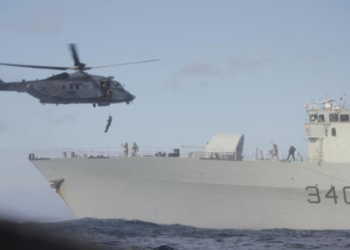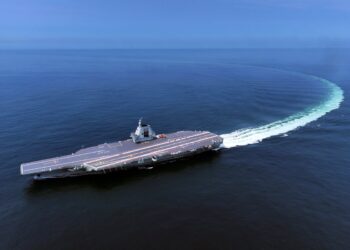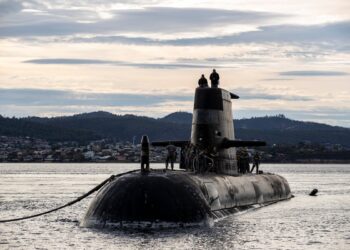**MANILA, Philippines (AP)** — China has failed to intimidate rival claimant states into surrendering their sovereign interests in the disputed South China Sea despite its intensifying “bullying tactics.” U.S. Pacific Fleet commander Adm. Stephen Koehler stated that the United States and allied countries are prepared to enhance deterrence against Beijing’s aggression.
During a forum in Manila on Friday, Koehler emphasized the U.S. commitment to defending freedom of passage and the rule of law in the Indo-Pacific region. He highlighted the Pacific Fleet’s mission to deter aggression and prevail in combat if necessary, working collaboratively with allies and partners.
Koehler remarked that China’s tactics have become increasingly aggressive, involving rammings, water cannon use, and lasers. He noted that despite these tactics, China has been unsuccessful in intimidating Southeast Asian claimant nations into relinquishing their rights to sovereign territories.
Although Chinese officials did not respond immediately to Koehler’s statements, they have previously advised Washington against interfering in what they claim is a purely Asian dispute that China aims to resolve peacefully. Koehler pointed out that nations like Indonesia, Malaysia, and Vietnam have maintained or expanded their offshore oil and gas operations in the South China Sea in the face of China’s assertiveness, while the Philippines has publicized the dangers posed by Chinese actions.
Koehler expressed admiration for the resilience shown by Southeast Asian countries in defending their maritime rights amid increasing pressure. He stressed that the U.S. Pacific Fleet stands ready to work with these nations to bolster deterrence and demonstrate that no individual country can be intimidated.
He asserted that effective deterrence has prevented more extensive conflicts and crises that could disrupt trade through the vital waterway. The forum, which coincided with the ninth anniversary of the 2016 international arbitration ruling that invalidated China’s claims to the South China Sea, included representatives from Western and Asian nations, such as the U.S., Canada, and Japan.
The Philippines brought its disputes with China to international arbitration in 2013, following a tense standoff over a shoal seized by Beijing. China did not participate in the proceedings and has since dismissed the ruling as a “sham”. U.S. Ambassador to the Philippines MaryKay Carlson described the ruling as a victory for the Philippines, serving as a guiding principle against the overpowering actions of larger nations.
Carlson noted, “Nine years on, Beijing has ignored the ruling and continues to operate with impunity,” criticizing China’s illegal and aggressive actions. She reaffirmed the U.S. commitment to defend the Philippines under the 1951 Mutual Defense Treaty, should Philippine forces face armed attacks.
Reflecting on the ongoing tensions with China, Philippine Foreign Secretary Theresa Lazaro mentioned efforts to enhance territorial defense and bolster military capacity, including initiatives to define territorial limits. She emphasized the need for dialogue with China, despite the strain on bilateral relations.
Discussions are scheduled for later this month in Beijing between Chinese and Philippine officials to address escalating disputes in the South China Sea and explore avenues for conflict prevention.













